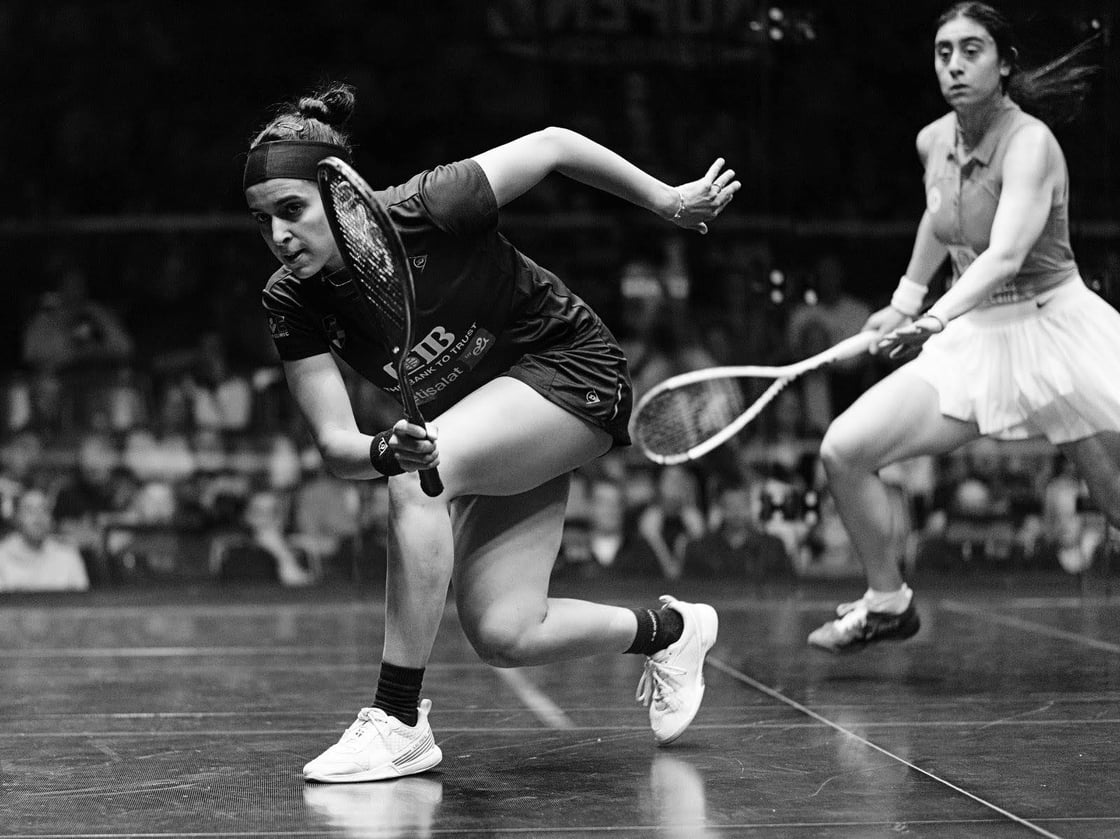In my previous article, I delved into 6 of my best tips for facing better opponents. When I talked about better opponents, I was referring primarily to players who you really didn't have much chance of beating, but, whom you could learn a lot from.
Well, for this article, I thought I'd turn the tables and cover my tips from the perspective of being that better player who is facing a worse player.
In similar context, by worse player, I'm referring to someone that you should beat relatively comfortably with no real threat of losing a game or match (as opposed to someone who is a lower standard on paper, but, who has every chance of winning the match still).
There levels in squash vary so much there is absolutely no doubt that you'll come up against players who are far better and far worse than yourself, whether that's in friendlies, league matches, team matches, or tournaments.
There are many ways to use either instance as an opportunity to improve your own game...
...and here's how to do it when facing an opponent of a lower level.
1. Sharpen Your Basics
Playing against a weaker opponent is the perfect chance to refine the basic foundations of your game.
Because there’s less pressure when you face a worse opponent who doesn't pose much of a threat, you can zone in on the building blocks that every player needs to have dialled in.
These core elements can get overlooked (or rushed) in tighter matches where you're more focused on scrambling for points.
It can be a very helpful thing to have an opportunity to slow things down and hit your lengths with purpose, for example.
Can you hit your targets consistently? Are your drives reaching the back corners with purpose and width, or are they dropping short and sitting up?
A weaker opponent may not punish short balls in the same way a stronger one would, but that doesn't mean you should lower your standards.
Use this as a test: Can you maintain that high-quality back-court game regardless of who’s on the other side of the court?
Once you’re dominating the basics, you’ll naturally start to force weak returns. This is when you get to test your basic decision-making and shot selection.
Have you forced a weak enough shot to go for a short shot? Or, do you want to bide your time a little longer in those back corners?
It can be very tempting to go for winners early, to end rallies quickly, or to show off your shot-making. But you’ll get far more out of the match by constructing rallies properly...
Length, pressure, opening, then execution.
It's a brilliant chance to slow the game down and focus on accuracy rather than intensity.
That goes for all the basic shots that you play more than winners in matches, even your serve!
The serve is one of the most overlooked shots in amateur squash, and weaker matches are a rare chance to practise it with focus.
Focus on getting that ball past your opponent, not allowing them to volley it and pinning them right in the back corner from the very start of the rally.
But, back to the topic at hand, sharpening those basics doesn't just help you in matches like these, it sets you up better for the tougher ones, too.
So, don’t treat an easier match as an excuse to switch off. Treat it as a chance to dial in your fundamentals without the chaos of high-pace, high-pressure rallies.
Strong basics are what allow you to dominate when you’re the better player, and stay competitive when you’re not.
Just look at the pros, top 100 squash players could quite easily beat any amateur-level player by hitting only drives to the back and nothing else. That's how dialled in their basic game is!
Remember, you can never be too good at the basics.
2. Work On Your Weaknesses
Looking at the bigger picture, one of the trickiest parts of improving at squash is being honest about what’s holding you back.
Sometimes, it's not easy to spot your weaknesses, especially if you’re focused on your strengths or just going through the motions in matches.
That said, certain weaknesses are hard to ignore. If your fitness isn’t up to scratch, for instance, it’s painfully obvious when you're struggling to get through long rallies or you're gasping for air between games.
But other weaknesses are often more subtle.
Maybe you subconsciously avoid lobbing because you don’t trust your ability to place them accurately. Or, perhaps your drop shots consistently sit up rather than dying in the front corner.
You might not even realize that you're boasting too often when you're under pressure instead of resetting the rally.
Then there’s the mental side: Are you patient in tight games, or do you panic and abandon your game plan as soon as things speed up?
The key is awareness.
If you’re unsure where you’re going wrong, ask people you play with most often. Most players are more than happy to offer constructive feedback.
Even better, film yourself playing. You might be surprised by how different your movement, shot selection, or body language looks on camera compared to how it feels in the moment.
Then, once you know your weaknesses, you can use your match against a worse player to work on them.
If you struggle with shot accuracy (to the front of the court for example), then this is a great chance to get a little more confidence with your winners.
If you struggle with your patience, then give yourself some rules or limits to stick to, such as only hitting to the back of the court or only going short off of a volley.
When playing against a worse player, there is minimal pressure on your shoulders, but you're still in a real match situation where you need to win. It's kind of the best of both worlds!
Again, as I said in the first section, facing your weaknesses against a player of a lower standard will translate very well when you come to play someone similar or better than yourself in the future.
It's a great way to progress your game!
3. Cut Out Unforced Errors
When you’re playing someone at a lower level, it can be tempting to relax a little too much, maybe to go for winners earlier than usual, or try fancy shots you wouldn't risk in a tighter match.
But if you’re looking to get something useful out of the match, these are exactly the habits you want to avoid. Playing down to your opponent’s level doesn’t benefit either of you at all.
You don't want to bring that passive, thoughtless style of attacking into matches against equal or better opponents.
One of the best things you can focus on against worse players is to practice cutting out unforced errors completely.
I know I touched on this in the previous section, however, I thought that it deserved its own section too.
Patience and accuracy take a heck of a lot of practice to truly master, and, if you can perhaps limit yourself to just 1 or 2 unforced errors per game, for example, it can benefit your game in the long term.
That means no tins from lazy drops, no boasts that are too low and aggressive, and no wild attempts at crosscourt nicks when you’re out of position. Think of it as a personal challenge: How few mistakes can you make in the match?
It’s a brilliant way to raise your standard of consistency.
Even pros at the highest level track their unforced error counts closely, because they know how much it influences their chances of winning. If a professional makes just one unforced error, they'll often be visibly frustrated with themselves.
By the way, when I refer to an unforced error, this is essentially making a mistake or forfitting a point when you weren't under any pressure.
So, if your opponent has you pinned in the back or hits a great winner and you lose the point, this isn't unforced, however, if you're stood on the T and your opponent has hit a boast that comes out into the middle that you then hit into the tin, this is an unforced error.
For club players, developing that level of discipline, especially when you’re not under pressure, is one of the most transferable skills you can work on.
It sets you up for when you're playing players at your level or above, where you will be punished for giving away free points.
There’s also a mental aspect to this.
It’s easy to switch off when you’re coasting. But if you treat a match like a test of consistency rather than just trying to win as quickly as possible, you’ll keep your mind engaged.
That sharpness carries over to every other match you play.
So next time you’re up against a player you’re confident of beating, challenge yourself to play error-free squash.
It’ll force you to focus on your shot quality, your length, your decision-making, all without relying on outright winners. If you can win rallies through accuracy, pressure, and control rather than risk, you’re not just winning, you’re improving.

Image credit: Steve Cubbins
4. Make It Competitive
When you’re the stronger player, you’re not just managing your own improvement, you’ve got a role to play in making sure the match is still a good experience for your opponent too.
That doesn’t mean patronising them by floating the ball around or obviously holding back, but it also doesn’t mean going full throttle and blowing them off the court either.
Most players have a good enough squash IQ to strike the balance.
Maybe it’s by working on your length, structure, or pace rather than trying to finish rallies quickly. Maybe it’s by giving your opponent time to play, or choosing to extend rallies rather than kill them early.
You can still play properly, competitively, and respectfully, without turning it into a one-sided demolision.
The benefit for you is clear, you get to practise control, accuracy, and shot selection in a slightly lower-pressure environment.
And your opponent gets the chance to work hard, learn, and enjoy the match without feeling outclassed.
Everyone leaves the court having progressed in one way or another!
I guess this section only needs to be short, but it definitely still needed to be included!

Image credit: Steve Cubbins
5. Practice Adapting Your Game To Different Styles
Beginners and intermediate-level players can often have unique and unorthodox styles compared to more established players.
You may be a better player than them on paper, however, you can still learn a thing or two from players who are perhaps more unpredictable with their shot selection, for example.
If your opponent is someone you've never played before, then this is even better.
This is the perfect chance to work on your tactics and adapting the way you play based on your opponent's style in real time.
Lower-level players often don’t follow the patterns or conventions that you're used to. They might hit unconventional boasts, throw in random lobs, or have awkward movement or technique that throws off your rhythm.
It’s easy to dismiss this kind of play as “bad squash,” but in reality, it gives you something valuable: the chance to adapt.
In matches that do matter, tight league games or tournaments, you’ll inevitably come up against players who don’t suit your preferred pace or style.
Having experience adjusting to something unfamiliar during the match itself can be a massive asset.
Try to ask yourself during the game... what’s their go-to shot? What kind of rallies do they prefer? What disrupts their flow?
Then shift your approach to suit.
That might mean playing with more width, volleying earlier, or even slowing things down. Treat the match like a puzzle that you need to solve, not just another easy win under your belt.
Being adaptable is a hallmark of a high-level squash player.
I do get it though, when you’re playing someone weaker, it’s tempting to just impose your game and steamroll through to get off the court quickly to save your energy.
Perhaps this is the best approach in a tournament situation where you have more games that day, however, if this match against a worse player is a one off or your only match of the day, you should use it to your advantage as much as possible.
If you take the time to observe, adjust, and experiment, you’ll sharpen your tactical instincts, and that pays off against all kinds of opponents, not just the unpredictable ones.
6. Treat It As A Coaching Opportunity (If Appropriate)
If you’re clearly the stronger player and the match isn’t particularly competitive, it can be great for both yourself and your opponent for you to start analysing their game and mentally noting areas in which they could improve...
As long as the setting, context, and relationship are right!
Not everyone wants unsolicited coaching, of course, so make sure you read the room as best you can.
But if you know the player reasonably well, or if the vibe of the session is clearly social or friendly, there’s no harm in gently offering a pointer or two, especially if they seem keen to improve.
It doesn't have to be anything too big, it could be as simple as telling them to get to the T quicker or just be a little more patient, however, it could really help them work on their own game in the long run.
Throw in some strengths too, as they can just as helpful for players to be aware of.
Most players are grateful for help when it’s offered in the right way, plus, this is helping you work your own ability to analyse your opponents' strengths and weaknesses.
When you explain technique or tactics to someone else, you’re reinforcing your own understanding of the game.
It forces you to observe more closely, to articulate why something works or doesn’t, and to think critically about shot choices and patterns, all of which sharpens your own game awareness.
It’s also a great way to contribute to the wider squash community.
Clubs and players thrive on that culture of learning, where stronger players help newer ones improve, not just by playing them but by taking a little time to pass something on.
If you can offer guidance without being condescending or overbearing, you’ll be helping others as well as yourself! Plus, it's always great to be able to coach someone effectively in the squash world.
This article was taken from our On The 'T' Newsletter, if you're interested in receiving more content like this, please feel free to sign up using the subscribe section located at the bottom left of this page (or underneath the article if you're on mobile), thanks!
